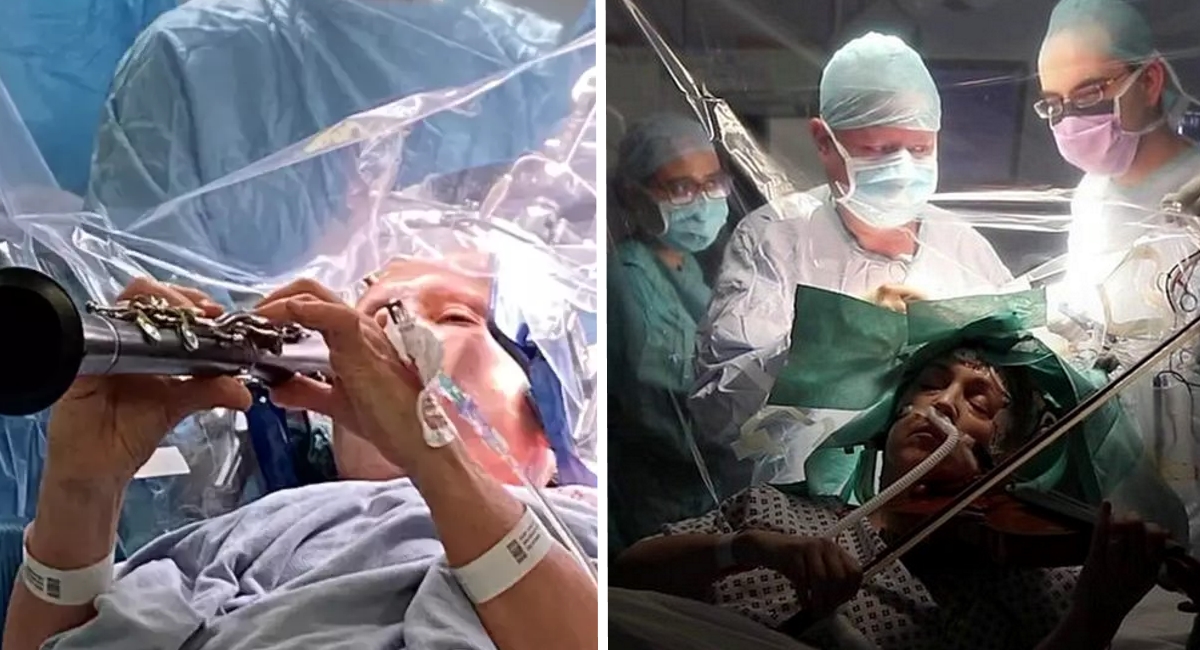In an extraordinary medical first that left surgeons stunned, a woman undergoing brain surgery calmly picked up her clarinet and began to play — right there on the operating table. The astonishing moment happened during a delicate procedure designed to preserve her musical abilities, as doctors worked inside her skull for more than four hours.
The patient, a 53-year-old professional clarinetist, had been diagnosed with a rare form of brain tumor affecting areas responsible for movement and coordination. Instead of putting her fully under anesthesia, surgeons at Policlinico Universitario Hospital in Italy performed the operation while she was awake — allowing her to play music mid-procedure to ensure they didn’t damage critical brain pathways.
“The moment she started to play, the entire operating room went silent,” one of the lead neurosurgeons told BBC News. “It was surreal. We were inside her brain, but her hands were moving, her breath was controlled, her music was alive.”
“We were inside her brain, but her hands were moving, her breath was controlled, her music was alive.” — Surgeon describing the extraordinary clarinet performance during awake brain surgery @BBCWorld
Doctors used a complex awake craniotomy technique that allows patients to remain conscious during parts of surgery, while their brain is mapped in real time. This method is typically employed in procedures involving speech or motor functions. In this case, it was adapted for music — making it one of the few documented surgeries in which a patient actively played an instrument on the table.
Before the surgery began, the team carefully positioned the woman upright so she could comfortably hold and play her clarinet. Electrodes were placed around her brain to monitor neural activity as she performed simple scales and short musical passages. “It wasn’t just symbolic,” the neurosurgeon explained to Reuters. “Every note she played gave us feedback about what part of the brain was still functioning normally.”
Her tumor was pressing against vital motor areas linked to hand coordination and breathing control — both essential for clarinet performance. By asking her to play throughout the procedure, doctors were able to carefully avoid damaging fibers critical to her art. “We moved millimeter by millimeter,” said the surgical director. “The music guided us.”
“The music guided us.” — Surgical director after a patient played clarinet throughout a four-hour brain operation @Reuters
The extraordinary operation was captured on video, showing the woman, fully conscious, seated upright with surgical drapes around her head while gently playing a classical melody. Surgeons can be seen calmly operating inches from her brain as she performs, focused and composed.
“It was emotional for everyone in the room,” a nurse told NBC News. “Hearing that music, knowing what was happening just centimeters away, was something I’ll never forget.”
The operation lasted just over four hours and was declared a success. Within days, the woman reportedly walked out of the hospital — and days later, she was playing her clarinet again at home. Doctors believe her ability to perform during surgery significantly improved the chances of preserving her motor and respiratory coordination.
This isn’t the first time musicians have played during brain procedures, but the level of complexity in this case has drawn international attention. A similar case in 2019 involved a violinist in London, but the clarinet introduces unique challenges because of its reliance on both fine finger movements and controlled breathing. “It’s like performing surgery on movement and breath at the same time,” said a neurologist interviewed by The Guardian.
“It’s like performing surgery on movement and breath at the same time.” — Neurologist on clarinet brain surgery @guardian
The patient, who has not been publicly identified, later gave a brief statement thanking the team for giving her “a second chance at music.” She added, “When they told me I might lose the ability to play, I was terrified. But when I woke up and picked up my clarinet again, I cried.”
Experts say this operation marks a growing trend in personalized neurosurgery — procedures tailored to patients’ individual skills and passions. “This is not just about saving lives,” one specialist told CNN. “It’s about saving the essence of who a person is.”
“It’s about saving the essence of who a person is.” — Neurology specialist on preserving patient abilities during brain surgery @CNN
As the story spread online, clips of the surgery have gone viral, with thousands of users marveling at the woman’s extraordinary composure and the precision of the medical team. One user wrote on X, “She didn’t just survive brain surgery. She performed through it. That’s pure strength.”
The woman is expected to make a full recovery and resume her musical career. Doctors say her story will likely inspire future approaches to neurosurgery that prioritize not just survival — but the preservation of what makes each patient unique.






